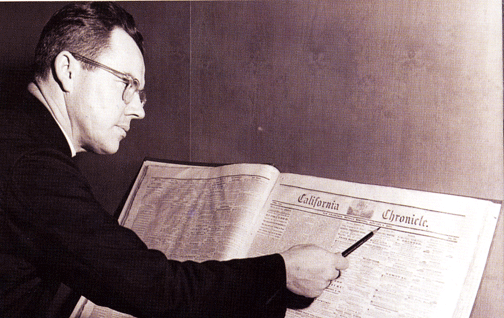USF: Collecting Dust
- by Bruce E. McKinney

William J. Monihan, collector of collectors
Peter Stansky, Frances and Charles Field Professor of History Emeritus, Stanford University, in a message to the head of the university wrote,
"In my view, to diminish the collection [by selling material] not only violates the faith of those who have donated, as I have in a minor way, but verges toward vandalism and philistinism."
Terry Belanger, University Professor, Honorary Curator of Special Collections and Director of the Rare Book School at the University of Virginia, visits the consequences such sales may have.
"I think a central point here is what actions like those taken by Father Privett [President of the University] do to future gift-giving - not only to USF, but books generally to institutions generally. I suspect that a great many more donors than is now the case will begin to add disposition conditions to their gifts to institutions [e.g. if at any time in the future the institution no longer wishes to undertake care of my gift then it is to be sold at auction for the benefit of the Red Cross/SPCA, home for unwed mothers [choose one]."
What has been a gentleman's club of understandings and courtesy could become a dogfight over regulations and requirements.
An assessment of the Donohue Rare Book Room, issued several weeks after the recent sale, made essentially the same points. Issued by two well-placed and well-regarded rare book library advocates, Susan M. Allen and Mark Dimunation, the report damns the University for shortsightedness, raises ethical concerns and openly questions the appropriateness of future gifts to an institution that is not demonstrating a commitment to maintaining its collections.
At the center of this maelstrom stands Father Stephen A. Privett, current President of the University of San Francisco and recently appointed to a third 5-year term. He is both responsible for his institution and responsible to a 42-member Board of Directors. Perhaps the structure of a Jesuit institution affords him a bit more latitude than the typical university president, where powerful faculty senates, boards, alumni and contributors can tie up virtually any controversial action forever. While responsible to those above him, it does appear Father Privett was able to act without consulting the various constituencies below or outside of his authority that usually tie a university president's hands. He acted, and his failure to consult these constituencies led to even greater resentment by those who felt left out of the process.
The rare book staff and supporters of the library in general, not just at San Francisco, but at libraries across the land, are deeply troubled. They realize that once material locked in the security of institutional collections is opened to public bidding, it may be lost forever. That is a nightmare of the first order to those who have devoted their lives to the preservation of cherished rare books. Add to this the fear that this may be just the tip of the iceberg, and their sharp, even harsh criticism becomes understandable.
Additionally, the various constituencies each have their own particular concerns. For those who have built their careers in the rare book rooms, there is the obvious concern about job security and the very purpose of their lives. The closing of a rare book room may take not only their livelihood, but their identity as well. The same may be said for the booksellers who supply the rare book rooms. Some may see them simply as merchants, but their role is much more complex than that. Dealers do more than provide books. They build collections. They frequently provide the research and intellectual perspective that determines what belongs in a collection. Oftentimes, they even steer donors to the library, for they are the ones who know the collectors. What they do may seem easy, but it is not. It's valuable, important and often under appreciated.